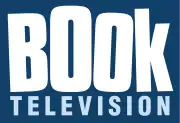BookTelevision
BookTelevision is a Canadian English language specialty channel owned by Bell Media. It was originally established as a network that would broadcast programming relating to books, literature, and various media. By the 2010s, it had shifted primarily to airing Bell Media library programming.
 BookTelevision logo | |
| Country | Canada |
|---|---|
| Broadcast area | National |
| Headquarters | Toronto, Ontario |
| Programming | |
| Language(s) | English |
| Picture format | 480i (SDTV) |
| Ownership | |
| Owner | Bell Media |
| History | |
| Launched | September 7, 2001 |
| Links | |
| Website | BookTelevision |
| Availability | |
| Cable | |
| Available on many Canadian cable systems | Check local listings |
| Satellite | |
| Bell Satellite TV | Channel 529 |
| Shaw Direct | Channel 594 |
| IPTV | |
| Bell Aliant Fibe TV | Channel 294 |
| Bell Fibe TV | Channel 529 |
| Bell MTS | Channel 305 |
| Optik TV | Channel 741 |
| SaskTel | Channel 63 |
| HuronTel Digital TV | Channel 362 |
| VMedia | Channel 273 |
| Zazeen | Channel 130 |
History
In November 2000, Learning and Skills Television of Alberta, a company majority owned by CHUM Limited (60%), was awarded a category 1 television broadcasting licence by the Canadian Radio-television and Telecommunications Commission (CRTC) called BookTelevision - The Channel, described as "a national English-language Category 1 specialty television service that will feature magazines and talk shows, dramas and documentaries that are exclusively based upon printed and published works, and offered with additional programming that provides an educational context and promotes reading."[1]
The channel was launched on September 7, 2001.[2] Although, shortly after the channel's launch, "The Channel" was dropped from its name and logo, resulting in a name change to simply BookTelevision.
On February 15, 2005, CHUM completed the purchase of the remaining interest in LSTA, bringing its ownership to 100 percent.[2] A year later, in July 2006, Bell Globemedia (later renamed CTVglobemedia) announced that it would purchase CHUM for an estimated $1.7 billion CAD, included in the sale was LSTA and its interest in BookTelevision.[3] The sale was subject to CRTC approval and was approved in June 2007,[4] with the transaction completed on June 22, 2007. In 2008, LSTA (then known as Access Media Group) was wound up into CTV Limited (the renamed CHUM Limited).[5]
On September 10, 2010, BCE (a minority shareholder in CTVglobemedia) announced that it planned to acquire 100% interest in CTVglobemedia for a total debt and equity transaction cost of $3.2 billion CAD.[6] The deal which required CRTC approval, was approved on March 7, 2011[7] and closed on April 1 of that year, on which CTVglobemedia was rebranded Bell Media.[8]
Along with Fashion Television, the channel later abandoned its original format, and began to primarily air reruns of library programming from other Bell Media networks, as well as reruns of dramas such as JAG and Matlock. The channel ceased investments in original Canadian programming, and was rarely promoted by Bell. In January 2021, the CRTC approved a request by Bell to revoke BookTelevision and Fashion Television's licenses, stating that it planned to shut both channels down on February 21.[9][10]
References
- Decision CRTC 2000-451, CRTC, 2000-12-14
- The history of CHUM Globe and Mail article 2006-06-12
- Bell Globemedia acquires CHUM Archived 2011-09-27 at the Wayback Machine; Fasken Martineau; 2006-07-12
- Broadcasting Decision CRTC 2007-165; CRTC; 2007-06-08
- Broadcasting Decision CRTC 2008-141, Canadian Radio-television and Telecommunications Commission, 14 July 2008
- Bell Canada (2010-09-10). "Bell to acquire 100% of Canada's No.1 media company CTV". CNW Group. Retrieved 2010-09-10.
- CRTC approves BCE's purchase of CTVglobemedia Archived June 29, 2011, at the Wayback Machine
- Bell completes acquisition of CTV, launches Bell Media business unit CNW 2011-04-01
- Faguy, Steve. "Bell Media to shut down Fashion Television and Book Television on Feb. 22". Retrieved 2021-01-21.
- "Fashion Television Channel – Revocation of licence". crtc.gc.ca. Canadian Radio-television and Telecommunications Commission. 2021-01-21. Retrieved 2021-01-21.